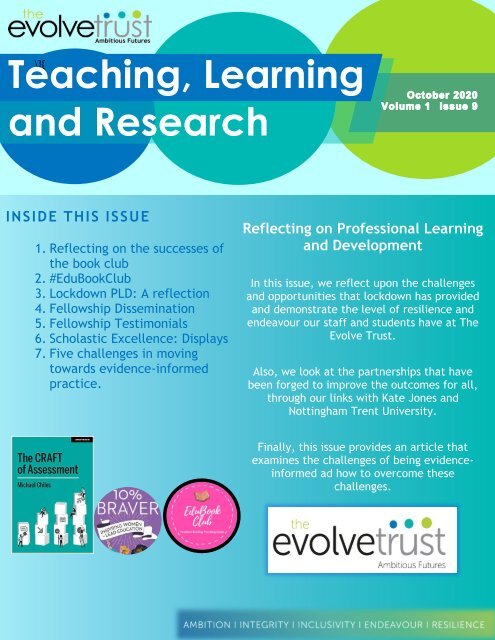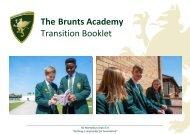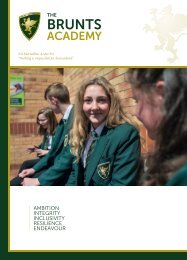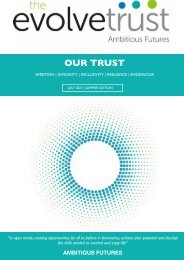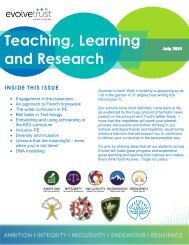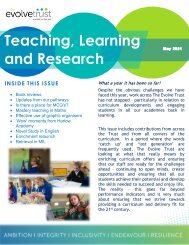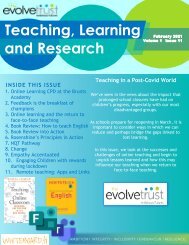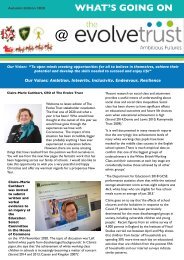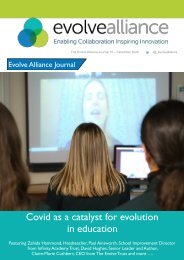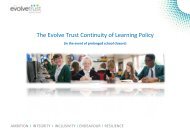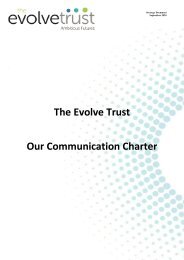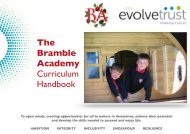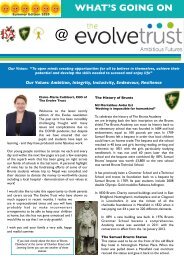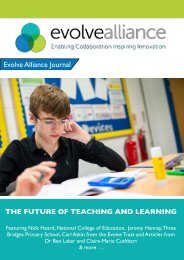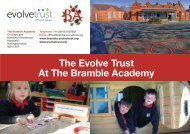Teaching, Learning and Research Autumn 1 2020
Create successful ePaper yourself
Turn your PDF publications into a flip-book with our unique Google optimized e-Paper software.
<strong>Teaching</strong>,<br />
\}{<br />
<strong>Learning</strong><br />
<strong>and</strong> <strong>Research</strong><br />
INSIDE THIS ISSUE<br />
1. Reflecting on the successes of<br />
the book club<br />
2. #EduBookClub<br />
3. Lockdown PLD: A reflection<br />
4. Fellowship Dissemination<br />
5. Fellowship Testimonials<br />
6. Scholastic Excellence: Displays<br />
7. Five challenges in moving<br />
towards evidence-informed<br />
practice.<br />
Reflecting on Professional <strong>Learning</strong><br />
<strong>and</strong> Development<br />
In this issue, we reflect upon the challenges<br />
<strong>and</strong> opportunities that lockdown has provided<br />
<strong>and</strong> demonstrate the level of resilience <strong>and</strong><br />
endeavour our staff <strong>and</strong> students have at The<br />
Evolve Trust.<br />
Also, we look at the partnerships that have<br />
been forged to improve the outcomes for all,<br />
through our links with Kate Jones <strong>and</strong><br />
Nottingham Trent University.<br />
Finally, this issue provides an article that<br />
examines the challenges of being evidenceinformed<br />
ad how to overcome these<br />
challenges.
Reflecting on the successes of the<br />
Book Club<br />
By Joe Morrin<br />
Page 2<br />
The Evolve Trust book club has been a resounding success this year, with many teachers developing<br />
resources for their departments, using Kate Jones’ strategies, <strong>and</strong> writing accounts on how it has<br />
changed their practice, for the <strong>Teaching</strong> <strong>and</strong> <strong>Learning</strong> Newsletter. Additionally, the Book Club has had<br />
a strong following on Twitter <strong>and</strong>, as a result, The Evolve Trust has supported teachers from different<br />
institutions, in the development of book clubs.<br />
Since the development of the book club, the author of the book, Kate Jones, has forged a strong<br />
relationship with the Evolve Trust <strong>and</strong> has promoted our book club <strong>and</strong> reflection logs with other<br />
schools <strong>and</strong> Twitter followers. Moreover, Kate has been willing to support our Trust <strong>and</strong> has hosted a<br />
PLD event for the Trust.<br />
This Year’s Book Club will focus on Michael Chiles’ ‘The CRAFT of<br />
Assessment’.<br />
CRAFT is a brilliant book for teachers at any stage of their career. This book looks<br />
at the discussions that surround the most effective process of assessment <strong>and</strong><br />
feedback, which has been a topic of significant debate in many schools in recent<br />
years. Michael Chiles is a Geography Teacher <strong>and</strong> Principle examiner. Besides<br />
this, he is strongly passionate about whole-school approach to assessment.<br />
We’ve already got 10 staff interested. If you are interested in joining, please let<br />
Joe Morrin know. Our first meeting is on 2 nd November on Teams.
#EduBookClub<br />
Using Technology Across the<br />
Trust<br />
By Joe Morrin<br />
Page 3<br />
If being part of a wider community of pedagogical book lovers is your thing. Why not join<br />
@EduBookClub1. Each month they EduBookClub looks at a new book, <strong>and</strong> it provides an<br />
excellent opportunity to share your experiences of the book with others <strong>and</strong> to ask the author<br />
questions. So why not get yourself on Twitter <strong>and</strong> join the discussion.<br />
On Sunday 16 th August, Natalie Aveyard from the Evolve Trust hosted<br />
a discussion on Caroline Perez’s book ‘Invisible Women’.<br />
Invisible Women shows how, in a world largely built for <strong>and</strong> by men,<br />
we are systematically ignoring half the population. It exposes the<br />
gender data gap a gap in our knowledge that is at the root of<br />
perpetual, systemic discrimination against women, <strong>and</strong> that has<br />
created a pervasive but invisible bias with a profound effect on<br />
women’s lives.<br />
This was a very interesting <strong>and</strong> thought-provoking discussion.<br />
@womenedbookclub @womened #invisiblewomen
Lockdown PLD: A reflection<br />
By Jessica Simpson<br />
Page 4<br />
During the lockdown, I spent the weekend (starting the 4 th April) watching<br />
online presentations by a range of brilliant educators. The event was run by<br />
<strong>Research</strong> Ed Durringham (@researchEDDHS). The CPD event was live on<br />
Twitter for the whole weekend which was great as it gave me time to watch<br />
all the videos (#rEDDurringtonLoom).<br />
Some of the amazing speakers included: Dylan Wiliam, Michael Chiles, Mark Enser, Mary Myatt <strong>and</strong><br />
David Didau. There was a varied choice of topics to listen to, including talks on: distance learning,<br />
assessment, leadership <strong>and</strong> helping students use effective learning strategies.<br />
The session on effective learning strategies was by Dr Flavia Belham (@FlaviaBelhamPhD) <strong>and</strong> looked<br />
at how to help students learn new information. The session was really useful <strong>and</strong> gave a range of<br />
different methods that can be used within the classroom. It highlighted methods such as retrieval<br />
practice, spacing <strong>and</strong> interleaving <strong>and</strong> dual coding. The talk really stressed that in order to reduce<br />
students’ cognitive load we need to make them (<strong>and</strong> their parents) aware of the different learning<br />
strategies. Dr Belham advocated that by showing students how they can use these methods to learn<br />
<strong>and</strong> retrieve information it would in turn help them to underst<strong>and</strong> how pathways are created in their<br />
own brains, eventually enabling them to become more active learners.<br />
Another video by Damian Benney (@Bennypenyrheol) spoke about ‘Using Desirable Difficulties to make<br />
learning easier’. Benny explained that ‘desirable difficulties’ (Bjork, 1994) are moments where the<br />
learner is left feeling slightly uncomfortable. His speech was interesting <strong>and</strong> suggested that conditions<br />
that lead to long- term retention create challenges <strong>and</strong> slow the rate of learning; ultimately making<br />
students uncomfortable. It is during these moments that Benney suggests the best learning can<br />
happen as the students are faced with challenge.<br />
Also Michael Chiles shared some information about his new book ‘The CRAFT of Assessment’. Chiles<br />
explained what each of his core values st<strong>and</strong> for: Condense, Reflect, Assess, Feed- forward <strong>and</strong><br />
Target- driven. He explained the idea of combining feedback with feeding-forward for students as<br />
really important <strong>and</strong> expressed that the feedback needs to be timely, receptive <strong>and</strong> fluid between<br />
pupil <strong>and</strong> teacher. I have ordered Chiles book <strong>and</strong> I am excited to find out more.<br />
In addition, Claire Stoneman (@Stoneman_Claire) also spoke about Willingham’s quotation “People<br />
are naturally curious, but we are not naturally good thinkers; unless the cognitive conditions are<br />
right, we will avoid thinking.” This suggests our brains are designed for the avoidance of thought <strong>and</strong><br />
that thinking can actually often be a slow <strong>and</strong> difficult process. She explained that we often rely on<br />
memory to make decisions. Naturally, we prefer to follow the paths to knowledge that are already<br />
rooted in our retrieval memory. This emphasises that we need to create new paths for students to<br />
find information (new <strong>and</strong> old) when developing learning. Stoneman proposes that we need to provide<br />
multiple <strong>and</strong> concrete examples of why <strong>and</strong> how something works as well as providing time for<br />
students to review <strong>and</strong> retrieve new learning.
Lockdown PLD: A reflection<br />
By Jessica Simpson<br />
Page 5<br />
At the minute <strong>Research</strong> Ed Home are sharing a whole series of videos (including the ones that I<br />
watched during this event) on Twitter at @researchEDhome. These are shared at 11.00am every<br />
weekday <strong>and</strong> I highly recommend these sessions to any of you who want to develop your own<br />
practice from the comfort of your own home.
Fellowship dissemination<br />
By Joe Morrin<br />
Page 6<br />
This year’s Fellowship participants presented their findings from their practitioner research to<br />
Nottingham Trent University <strong>and</strong> The Evolve Trust Executive Team as part of their assessed work for the<br />
30 Credit M-Level module ‘Reflecting on Professional Development’.<br />
All participants were praised for the quality <strong>and</strong> delivery<br />
of their presentations, especially in light of some<br />
technical challenges. Although this dissemination tool is<br />
essential to the participants Masters Award, the outcomes<br />
of the Practitioner research will go on to inform staff<br />
practice, school, local <strong>and</strong> national policy. Well done to<br />
all for passing their Masters course.<br />
The project titles were as follows:<br />
• The use of quizzing to correct student<br />
misconceptions <strong>and</strong> embed knowledge at KS3.<br />
• What impact does whole class feedback have on<br />
student engagement with feedback <strong>and</strong> teacher<br />
workload?<br />
• Improving Written Expression in Boys with ADHD<br />
• What are the benefits (in terms of learner<br />
engagement <strong>and</strong> progress made) of practical<br />
learning/learning through play, combined with an<br />
effective assessment tool (to capture those small<br />
steps) for learners with severe learning disabilities<br />
(SLD)<br />
• The effectiveness of spaced retrieval practice on<br />
Pupil Premium boys in improving their retention of<br />
subject knowledge.<br />
• Misdiagnosed, misunderstood or missed all<br />
together. What type of support is needed for<br />
successful inclusion of autistic females?
Fellowship Testimonials<br />
By Joshua Morris <strong>and</strong><br />
Grant Nightingale<br />
Page 7<br />
The fellowship has had a significant impact on teachers’ professional practice <strong>and</strong> participants have<br />
been willing to share their views about the programme. Here’s some of their testimonials:<br />
Joshua Morris’ project looked at the effectiveness of spaced retrieval practice on Pupil Premium<br />
boys in improving their retention of subject knowledge.<br />
Why did you want to do the Fellowship?<br />
I wanted to do the Fellowship course as I wanted to further investigate the use of Retrieval Practice<br />
as a teaching tool <strong>and</strong> better my underst<strong>and</strong>ing of the pedagogy that underpinned it. I also was<br />
interested in developing my teaching practice, both pedagogically <strong>and</strong> practically, as having only<br />
just finished my PGCE I wanted to continue to learn new skills <strong>and</strong> tips to further cement my<br />
practice in my upcoming NQT – which I found very useful<br />
What did you get from it?<br />
From the course itself I got lots from the reading aspect <strong>and</strong> the sessions led by NTU. They<br />
introduced new ways of reflective practice, again both practically <strong>and</strong> pedagogically, <strong>and</strong> most<br />
importantly they were relevant to your working environment in a school rather than just a<br />
pedagogical idea that in its practice was not functionable. As well as this, I also developed my<br />
leadership <strong>and</strong> research skills as I was able to lead the project myself <strong>and</strong> also collate information<br />
that I myself was in charge of analysing <strong>and</strong> also presenting – which again is another great<br />
experience to add to your teaching skillset. The group sessions were also really useful as it allowed<br />
you to meet up with others, who were at a similar stage in their careers, this enabled us to share<br />
ideas <strong>and</strong> techniques more broadly as well as specific to our projects.<br />
Would you recommend it <strong>and</strong> why?<br />
I would highly recommend the Fellowship project, as it enables you as a teaching practitioner to<br />
fine tune your teaching practice in a way that allows you measure an outcome, which it is desirable,<br />
could potentially shape the department/school that you work in.<br />
Grant Nightingale’s project assessed the impacts of whole class feedback on student engagement<br />
<strong>and</strong> teacher workload?<br />
Why did you want to do the Fellowship?<br />
I wanted to complete the fellowship as I saw it as an exciting opportunity to reflect upon <strong>and</strong><br />
develop my practice. I knew there would be plenty of support available <strong>and</strong> it allowed me to further<br />
my pedagogical knowledge.<br />
What did you get from it?<br />
The fellowship provided me with a further opportunity to engage with pedagogical research <strong>and</strong><br />
embed this research into my own teaching. It built my confidence in terms of my own skill set <strong>and</strong><br />
has led to me feeling more accomplished in my field.<br />
I would fully recommend the fellowship program as it's an excellent opportunity for you to gain<br />
further Masters credits whilst engaging with pedagogical research <strong>and</strong> conducting your own as part
Scholastic Excellence: Displays<br />
Page 8<br />
Our staff across the Trust have been working tirelessly to produce some amazing display boards,<br />
creating a stimulating environment for all of our students.<br />
Languages<br />
Novel Study – Iron Man<br />
Physical Development <strong>and</strong> Well Being
Scholastic Excellence: Displays<br />
Page 9<br />
Animal Farm<br />
Titanic Novel Study
Scholastic Excellence: Displays<br />
Page 10<br />
The ‘Pledgehog’<br />
Key Religions
Five Challenges in moving towards<br />
Evidence-informed practice<br />
By Louise Stoll Page 11<br />
An international spotlight is now shining on evidence-informed practice. In a fast-changing world, where<br />
diverse groups of pupils need to be prepared for their future rather than their parents’ past, the nature of<br />
teacher professionalism has changed. This now includes teachers having the confidence to access <strong>and</strong>/or<br />
create the knowledge they need with colleagues <strong>and</strong> share it to benefit others as well as themselves<br />
(Schleicher, 2015). Being evidence-informed is therefore at the heart of teacher professionalism. So why<br />
doesn’t everyone just get on with it? Here, I pose five challenges that need addressing before this vision<br />
can be realised; I offer thoughts on ways to tackle these, <strong>and</strong> then conclude by raising questions as a<br />
stimulus for conversation.<br />
Challenge 1:<br />
Thinking too narrowly about ‘evidence’<br />
People have different conceptions about ‘evidence’ (Coldwell et al., forthcoming). Some practitioners<br />
think about their own or their colleagues’ practice, including pupils’ reactions, while others only accept<br />
evidence that incorporates statistical effect sizes that demonstrate the link between a classroom<br />
intervention (for example, mastery learning) <strong>and</strong> externally-assessed pupil progress. For me, evidenceinformed<br />
practice involves using <strong>and</strong> promoting a thoughtful blend of three forms of evidence gathering.<br />
External research – while effect-size research is a valid form of research, this type of research is not usually<br />
linked to wider outcomes, such as creativity, resilience, etc. <strong>Research</strong> also exists on how children <strong>and</strong><br />
young people learn, for example, motivation, the social nature of learning, etc. <strong>and</strong> the implications for<br />
creating appropriate learning environments. Then there is research on professional learning, bringing about<br />
change, leadership, schools as learning communities, all of which is relevant when using evidence to<br />
enhance practice.<br />
Different kinds of data – this includes a range of pupil data, going well beyond what’s usually assessed, to<br />
include, for example, critical thinking, entrepreneurship <strong>and</strong> wellbeing; data on teachers <strong>and</strong> teaching,<br />
school leadership <strong>and</strong> the school as a place to learn <strong>and</strong> develop; <strong>and</strong> looking at different forms of<br />
assessment, such as portfolios, observations, surveys <strong>and</strong> interviewing pupils. Evidence-informed practice<br />
uses data at the start (as a baseline), throughout (to evaluate processes) <strong>and</strong> at the end (to evaluate<br />
impact).<br />
Collaborative enquiry <strong>and</strong> research <strong>and</strong> development (R&D) – these are forms of research that include<br />
cycles of investigating practice, exploring, trialling <strong>and</strong> carefully evaluating new practices. These forms<br />
frequently incorporate the other two.<br />
Challenge 2:<br />
Being ‘driven’ by evidence<br />
A read of policy documents highlights the interchangeable use of two terms: ‘evidence-based’ <strong>and</strong><br />
‘evidence-informed’. The distinction is important. If teaching is ‘evidence-informed’ rather than<br />
‘evidence-based’, teachers are in the driving seat, not the evidence. This fits with another important<br />
feature of teacher professionalism – autonomy. Like their pupils, teachers aren’t empty vessels waiting to<br />
be filled up. They bring prior knowledge, experience <strong>and</strong> underst<strong>and</strong>ing of their context. Teachers need<br />
the confidence <strong>and</strong> skills to connect what they already know with the different evidence forms <strong>and</strong> use<br />
this to make wise decisions about ways to develop their practice. Think about it this way – evidence isn’t<br />
just informing teachers’ practice; it’s enriching it. If we assume that much practice is good anyway, the<br />
idea of using evidence <strong>and</strong> related enquiry processes is that they can add something valuable, helping<br />
teachers to think about <strong>and</strong> try out ways to make practice more powerful (see Figure 1).
Five Challenges in moving towards<br />
Evidence-informed practice<br />
By Louise Stoll Page 12<br />
Challenge 3:<br />
Risking your own practice being challenged<br />
Engaging in evidence-informed practice can be risky. It may seem easier to ignore problems, not to try to<br />
find out why things aren’t working, or to just keep doing the same things rather than get out of your<br />
comfort zone <strong>and</strong> try something different. Evidence-informed practice invariably throws up challenges that<br />
force teachers to question their assumptions about the best ways pupils learn. That’s good, because<br />
professional learning should challenge assumptions as part of changing practice (Stoll et al., 2012), <strong>and</strong><br />
evidence-informed practice is a form of professional learning. But you need a steady nerve; taking it<br />
seriously requires an enquiry habit of mind (Earl <strong>and</strong> Katz, 2006) – being open, keen <strong>and</strong> willing to keep<br />
exploring <strong>and</strong> evaluating the best ways to support pupils’ learning, development, progress <strong>and</strong> achievement<br />
in their context. It also requires a commitment to learning new skills, developing new teaching strategies<br />
as necessary, <strong>and</strong> practising them deliberately to develop expertise (Stobart, 2014). Unquestionably,<br />
evidence-informed practice isn’t about st<strong>and</strong>ing still.<br />
Challenge 4:<br />
Convincing others about the value of evidence-informed practice<br />
I assume (or at least hope) that most readers are interested in evidence-informed (or evidence-enriched)<br />
practice, if not passionate about its merits. But you will no doubt know<br />
colleagues who are not similarly predisposed, including some who are downright sceptical or resistant.<br />
Persuading yourself to invest the energy <strong>and</strong> take the associated risk of practice change is one thing;<br />
convincing others is altogether different. Language is important here. I used the term ‘evidence-enriched’.<br />
It may be a matter of taste, but when introducing initiatives, it can help to suggest that colleagues will be<br />
building on strengths. Given already considerable workloads, some people will want persuading that<br />
evidence-informed practice ‘works’ – they’ll only be convinced by evidence. Designing small projects with<br />
other interested volunteers <strong>and</strong> then sharing the findings – especially quick wins <strong>and</strong> other successes, but<br />
also what you’ve learnt not to do – is commonly used to build up support <strong>and</strong> move towards the point where<br />
many colleagues are engaged.<br />
For readers who are senior leaders (especially head<br />
teachers/principals), your interest in <strong>and</strong> commitment to<br />
evidence-informed practice is critical. In all my research,<br />
evaluation <strong>and</strong><br />
R&D projects, where the head teacher has seriously<br />
‘bought in’ to underst<strong>and</strong>ing evidence-informed practice,<br />
using evidence <strong>and</strong> backing colleagues doing so, efforts<br />
to develop a culture of enquiry <strong>and</strong> related practice<br />
throughout the school have been more successful. These<br />
head teachers ensure the conditions in schools that<br />
enable other colleagues to become fully engaged <strong>and</strong><br />
follow through – for example: time, access to research<br />
resources, opportunities for knowledge-exchange,<br />
modelling being evidence-passionate (by reading<br />
themselves, for example) <strong>and</strong> testing out their own<br />
theories of action about what they expect from particular<br />
interventions, nurturing evidence champions, networking<br />
<strong>and</strong> connecting with critical friends <strong>and</strong> research partners<br />
(Stoll, 2015).
Stoll L, Harris A <strong>and</strong> H<strong>and</strong>scomb G (2012) Great professional development which leads to great pedagogy:<br />
Five Challenges in moving towards<br />
Evidence-informed practice<br />
By Louise Stoll<br />
Page 13<br />
Challenge 5:<br />
Going it alone<br />
It may be evident from what has gone before that I see evidence-informed practice as a collaborative<br />
endeavour. Considerable international research now exists highlighting the importance of collaboration,<br />
social learning <strong>and</strong> collective learning. Autonomy within professionalism today is much more about<br />
collective agency (can do) <strong>and</strong> responsibility (accountability to peers) (OECD, 2016a). And a third, related<br />
feature of teacher professionalism these days is peer networking – collaborating with colleagues within<br />
<strong>and</strong> across schools. I wouldn’t want to prevent any individual who is keen from carrying out a piece of<br />
enquiry with their own pupils – that’s great – but I just think more broadly about what it could be like if<br />
a whole system was evidence-informed. I know that there are examples of schools that are learning<br />
organisations (OECD, 2016b), where teachers connect with colleagues in their school <strong>and</strong> others to carry<br />
out evidence-rich collaborative enquiry, to learn together <strong>and</strong> find creative <strong>and</strong> compelling ways of<br />
sharing findings <strong>and</strong> moving knowledge about evidence-informed practice around the system. But there’s<br />
a way to go yet if this is to become systemic <strong>and</strong> sustainable.<br />
Conclusion<br />
Enriching your practice with evidence can be satisfying <strong>and</strong> fruitful, but also challenging. These<br />
challenges are worth embracing, but they aren’t easy to address, <strong>and</strong> I’m sure there are others that I<br />
haven’t discussed. Here are a couple of questions as conversation starters:<br />
Do you face any, or all, of these challenges? How are you addressing them? What else might you do?<br />
What other challenges to evidence-informed practice can you think of? How will you tackle these?<br />
References<br />
Coldwell M, Greany T, Higgins S, Brown C, Maxwell B, Stiell B, Stoll L, Willis B <strong>and</strong> Burns H (Forthcoming)<br />
Evidence-Informed <strong>Teaching</strong>: An Evaluation of Progress in Engl<strong>and</strong>. Report for The Department for<br />
Education.<br />
Earl L <strong>and</strong> Katz S (2006) Leading Schools in a Data-Rich World: Harnessing Data for School Improvement.<br />
Thous<strong>and</strong> Oaks, CA: Corwin Press.<br />
OECD (2016a) Supporting Teacher Professionalism: Insights from TALIS 2013. Paris: OECD Publishing.<br />
http://dx.doi.org/10.1787/9789264248601-en.<br />
OECD (2016b) What Makes a School a <strong>Learning</strong> Organization: A Guide for Policy Makers, School Leaders<br />
<strong>and</strong> Teachers. Paris: OECD publishing. https://www.oecd.org/education/school/schoollearningorganisation.pdf<br />
Schleicher A (2015) Schools for 21st-Century Learners: Strong Leaders, Confident Teachers, Innovative<br />
Approaches. International Summit on the <strong>Teaching</strong> Profession. Paris: OECD Publishing.<br />
http://dx.doi.org/10.1787/9789264231191-en.<br />
Stobart G (2014) The Expert Learner: Challenging the Myth of Ability. Maidenhead: Open university Press.<br />
Stoll L (2015) Using evidence, learning <strong>and</strong> the role of professional learning communities. In Brown C (ed)<br />
Leading Evidence Use in Schools. London: IOE Press.


